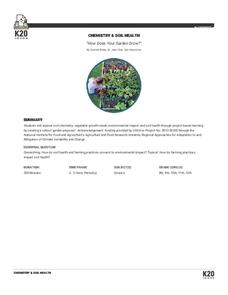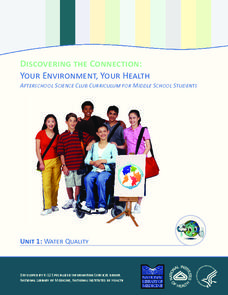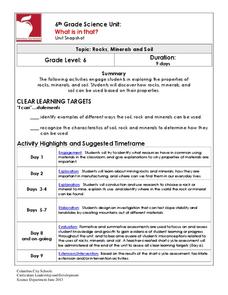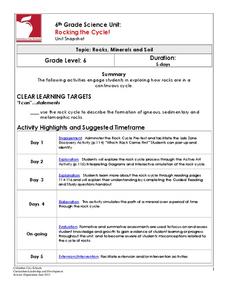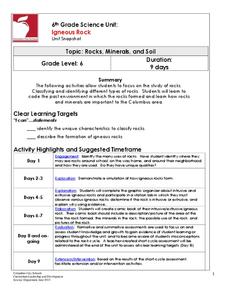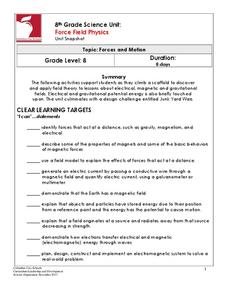Science 4 Inquiry
Atmospheric Layers
Space diving refers to the act of jumping from outer space and falling through Earth's atmosphere before parachuting to land. Scholars learn about this extreme activity and study the layers of the atmosphere they must conquer in the...
K20 LEARN
How Does Your Garden Grow?
Seventy thousand different types of soil exist in the United States alone. Young scientists learn about the importance of soil to the food supply. They test soil for a variety of factors and determine the best place to set up a community...
Science 4 Inquiry
Expanding the Universe
When Einstein first heard the theory of the expanding universe, he dismissed it as bad physics. Now scholars learn about the theory and how scientists prove it has merit. Through a hands-on simulation and videos, class members measure...
Science 4 Inquiry
Deforestation
Young scientists observe deforestation from satellite photos and discuss the importance of forests to the global environment. They then simulate a plot of forest when farmers move into the area over the course of seven years. Finally,...
Science 4 Inquiry
An Investigative Look at Florida's Sinkholes
In May of 1981, the Winter Park Sinkhole in Florida first appeared and is now referred to as Lake Rose. Scholars learn about the causes of sinkholes through an inquiry project. Then, they analyze recent data and draw conclusions to...
National Library of Medicine
Your Environment, Your Health: Air Quality
Some scientists argue that air pollution now causes more deaths than smoking. The second unit in a six-part series focuses on air quality. Scholars learn what's in the air, how clean the air around their school is, and what they can do...
National Library of Medicine
Your Environment, Your Health: Runoff, Impervious Surfaces, and Smart Development
Can a sidewalk increase the amount of pollution in local streams? Scholars learn the answer to this question though research and experimentation in the fifth unit in the six-part series. Pupils study runoff, impervious surfaces, and the...
National Library of Medicine
Your Environment, Your Health: Food Safety
Did youknow that chicken causes the greatest risk of food-borne illness. The fourth unit in a six-part series addresses food safety. Scholars research common scenarios of food causing illness through the National Institute for Health....
National Library of Medicine
Your Environment, Your Health: Chemicals in Your Home
Many people know about chemical pollution, but are all chemicals bad? The third unit in a series of six addresses chemicals common in everyday life. Scholars learn about the chemicals found in their own homes, chemical safety, and...
National Library of Medicine
Your Environment, Your Health: Water Quality
How important is water quality where you live? The first module in a six-unit series includes four lessons on water quality. By applying the concept directly to the lives of pupils, they engage in meaningful learning. They read about...
Oceanic Research Group
Heat Transfer and Cooling
Astronauts train underwater to simulate the change in gravity. An out-of-this-world unit includes three hands-on activities, one teacher demonstration, and a discussion related to some of the challenges astronauts face. Scholars apply...
Cornell University
Non-Newtonian Fluids—How Slow Can You Go?
Children enjoy playing with silly putty, but it provides more than just fun. Young scientists make their own silly putty using different recipes. After a bit of fun, they test and graph the viscosity of each.
Cornell University
Buoyancy
Swimmers know to float by turning their bodies horizontally rather than vertically, but why does that make a difference? In an interesting lesson, scholars explore buoyancy and the properties of air and water. They test cups to see which...
California Academy of Science
Color Vision Genetics Evolution Simulation
At one point, all mammals carried only two color receptors, but now most humans carry three. An informative presentation and hands-on activity demonstrate how this evolved through genetics. By participating in the activity, pupils...
Towson University
Mystery of the Crooked Cell
Can your class solve the Mystery of the Crooked Cell? Junior geneticists collaborate to learn about sickle cell anemia in a fascinating lesson plan. The included materials help them to examine the genetic factors behind the disease...
Columbus City Schools
Changes All Around Us
Whoa! What just happened? That's right, change is everywhere. But what exactly is changing? Middle school science sleuths get to the bottom of the changes matter can experience. Through simple demonstrations, engaging videos, and an...
Columbus City Schools
What is in that?
Invite your class to dig in to an engaging journey into the world of mining! Here you'll find the tools to equip young miners with knowledge of soil, rocks, and minerals, as well as types of mining operations. To round things out, the...
Columbus City Schools
Rocking the Cycle!
Time to rock out! Discover the "life" cycle of the average rock using an illustrative stations lab and stimulating pairs game. Roll the dice to determine your fate: will it be melting in magma or chilling out to form igneous rock? The...
Columbus City Schools
Igneous Rock
These rocks are HOT! Well, they used to be, anyway. Take young geologists on a two-week journey through the life and times of the average igneous rock. Lab groups work together to hypothesize about intrusive and extrusive igneous rock...
Columbus City Schools
ABC: Acid Base Chemistry
Bubble, bubble, boil and trouble! What causes common substances like baking soda and vinegar to react the way they do? Welcome your junior chemists to the wonders of acid-base chemistry using a comprehensive and fun resource. Engage them...
Columbus City Schools
To Measure its Mass or Volume?
Atoms, elements, and molecules, oh my! Teaching the fundamentals of chemistry to curious sixth graders has never been easier to accomplish. Here is a resource that pulls together everything needed to get them off to a good start,...
Columbus City Schools
Force Field Physics
Attracted class members to an activity-packed journey through the science behind the invisible forces at work all around us. From jump rope generators to junkyard wars, there's never a dull moment when eighth grade physics scholars...
Columbus City Schools
Get Your Organisms Organized
From large to small, show your class how to organize them all! Included within the guide is everything you need to take their knowledge of classification from the cellular to the species level. The worksheets focus on building vocabulary...
Columbus City Schools
You Can’t Sneeze On This Tissue
Take your class' understanding of cells to the next level... or levels! Demonstrate the levels of organization using a variety of engaging methods. The teacher's guide includes the materials you'll need to execute a flower dissection,...



